In preparation of the challenge, I received Aurifil's Dolomite Green Color Builder box (with 50wt spools in colors #2908 Spearmint, #1147 Light Leaf Green, and #2890 Very Dark Grass Green), Olfa's Chenille Cutter, and three green fat quarters of Michael Miller Cotton Couture solids (Spring, Lime, and Leaf). I have never used the Olfa Chenille Cutter before, but I love adding texture to quilts! I was excited to try it out!
This post contains affiliate links. As an Amazon Associate I earn from qualifying purchases.
If you're new here, hello! I'm Laura! I design quilt patterns, and I'm a self-proclaimed deal hunter! Be sure to join the popular Quilting & Sewing Deals Facebook group where I post sales, deals, and coupon codes from all around the web!
Be sure to check out the feature of this project on the Aurifil blog! Pat Sloan is featured this month too! See what she made with the Olfa chenille cutter on her blog!
I immediately started thinking about how to utilize chenille strips within quilt blocks to make the most out of the green fabric. I also knew I would be creating this project in March as spring was just trying to emerge out of winter. This was exactly the inspiration I needed!
This tutorial makes four 20" quilt blocks that when sewn together make a 40" x 40" baby or lap quilt. To make a larger quilt, create more blocks!
What you need:
(3) 1/2 yard cuts of Michael Miller Cotton Couture solids in Spring, Lime, and Leaf
1 3/4 yards Michael Miller Cotton Couture solid in Bright White
Aurifil's Dolomite Green Color Builder box with 50wt thread in colors #2908 Spearmint, #1147 Light Leaf Green, and #2890 Very Dark Grass Green
Olfa Chenille Cutter
Crib-sized batting (I used Hobbs natural cotton batting)
1 1/4 yards backing fabric (I used Michael Miller's Abloom First Blush Garden print)
Cutting:
From each of the solid fabrics, cut 1" diagonal strips. I used the 45 degree line on my acrylic ruler as a guide, and cut strips from the entire piece of fabric.
From the solid white fabric, cut the following quantities and sizes of WOF strips:
(2) 8 1/2" x WOF strips
(3) 6 1/2" x WOF strips
(4) 4 1/2" x WOF strips
Subcut the 8 1/2" x WOF strips into:
(4) 8 1/2" x 8 1/2" squares - A
(8) 4 1/2" x 8 1/2" rectangles - B
Subcut the 6 1/2" x WOF strips into:
(4) 6 1/2" x 8 1/2" rectangles - C
(8) 6 1/2" x 6 1/2" squares - D
(4) 4 1/2" x 6 1/2" rectangles - E
Subcut the 4 1/2" x WOF strips into:
(8) 4 1/2" x 8 1/2" rectangles - F
(16) 4 1/2" x 4 1/2" squares - G
Let's sew it!
Layout all the white squares and rectangles to make one block following the diagram below.
Now here's where you get to "slice & stitch!"
Choose one white square or rectangle from the layout and lay it right side down. Lay THREE layers of the 1" strips at an angle from the top to the bottom. Trim the extra from the strips so that it extends just a bit beyond the block. Vary the angles for each one! Make some really slanted and others almost straight up!
Using coordinating Aurifil 50wt thread, stitch along both sides of the strip to secure it to the white piece. I used about a 3/8" seam allowance.
Repeat for all squares and rectangles in the block. Then repeat for the other three blocks too.
Place a fabric square right side up. Using scissors, carefully snip through the top three layers of fabric. Be sure to center your snip between the two stitched lines. Do not cut the bottom green layer!
Place the Olfa Chenille cutter into the channel. Choose the setting size that fits with the size you sewed your channel. I set mine on the medium setting, but large or x-large might work too! This setting helps the cutter to remain centered along the channel as you cut.
Hold onto the fabric behind the cutter with one hand, then use your other hand to slide the cutter to the other side! It works just like a letter opener!
Repeat!
Remember not to cut through the bottom layer!
Trim the extra colored strips from the squares/rectangles.
Now it's time to sew them into blocks!
When sewing, make sure that all the layers of fabric lay flat. After sewing two pieces together, press the seams open to help reduce bulk.
Use the diagram to lay out all the pieces for one block again.
Use the diagram and sew the pieces together in the following order. The block assembly is generally from the top left to the bottom right.
G ---> G
GG ---> F ---> A ---> F
Set unit GGFAF aside.
E ---> G ---> G
Set unit EGG aside.
B ---> B
BB ---> C
Now sew:
BBC ---> EGG
Next:
D ---> D
BBCEGG ---> DD
Then sew unit GGFAF to that.
Repeat to make four blocks. Sew four blocks together to make the quilt top.
The back looks quite different than the front!
Now it's time to quilt!
I quilted mine on my longarm, but quilting on a domestic or hand quilting would work great too!
I quilted a medium sized meander on the quilt using Aurifil 50wt #2908 Spearmint, but never quilted over the top of a slice!
I quilted right up to the stitched lines of each block.
I trimmed off the excess batting and backing fabric, then bound the quilt by machine. (Tutorial for that HERE.)
One last look before the magic happens!
Washing the quilt causes the amazing texture and effect of the chenille cutter to happen! I always toss in a Color Catcher when I wash a quilt just to be cautious.
The quilt came out so soft and cuddly!
All the green fabric that was cut at a 45 degree angle doesn't fray at all! So cool! But the white fabric does fray when not cut at that same angle.
A quick trim removes all the loose threads and looks just the same as the green fabric!
Here you can see how much a difference that the angle on the white fabric makes. The strip on the left is more vertical, but the strip on the right is about a 45 degree angle. Lots of fraying of the one on the left, but none at all on the one on the right!
Our weather has *just* started to warm up and there is the slightest hint of green in the grass and buds on the trees. This quilt reminds me of exactly that time of year!
The quilt is a happy peek of spring, and the chenille texture is a really fun and unexpected element!
Thank you Aurifil, Olfa, and Michael Miller for the fabric, thread, and tools to make this quilt possible!!
Let me know if you make a quilt inspired by this tutorial! And thank you for pinning it on Pinterest!
__________
If you liked this post, you may also like these:













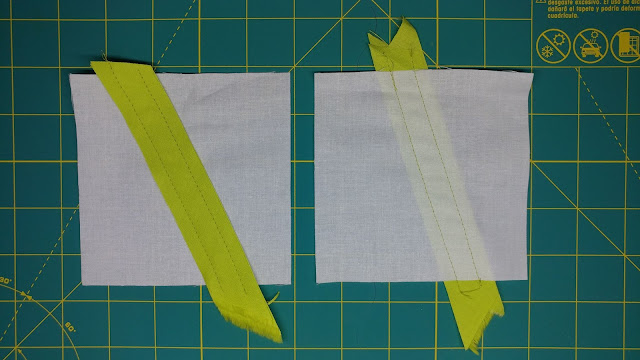


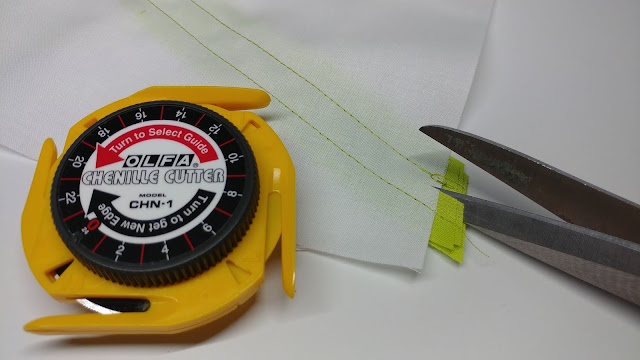
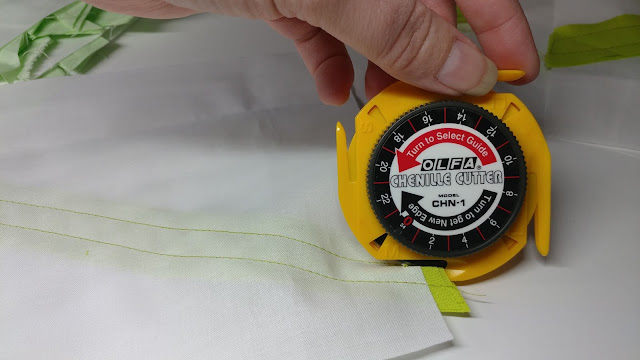













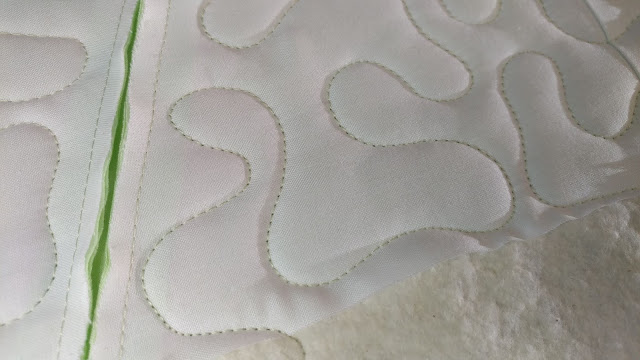

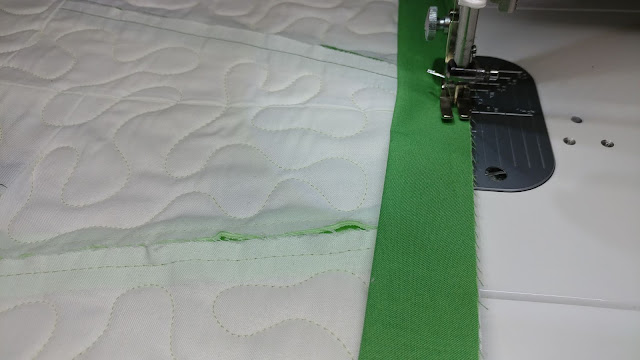

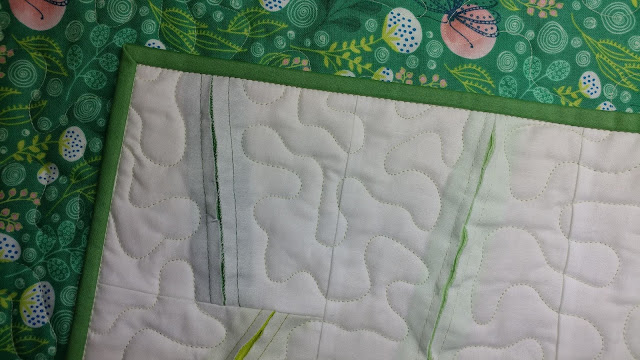

















The wash really is the magic step in this process, isn't it? I love your creativity and how this quilt came together!
ReplyDeleteI'm always amazed at your creative thinking! The texture and dimension you've given this quilt is awesome! Perfect work...as always!
ReplyDeleteWhat a neat baby quilt this would be in bright happy strips! The baby would love the textures! Wonderful
ReplyDeleteSo subtle but so fun! Love the tutorial and looks like something fun to try, but I need a looser weave white than what I have (at the moment). Oh, and if you want my tips/tutes linky is open till the end of the month, love to have you there... https://www.kathleenmcmusing.com/2020/03/tips-and-tutorials-on-the-22nd-3-ttot22.html
ReplyDeleteThank you for posting it too!!
ReplyDelete